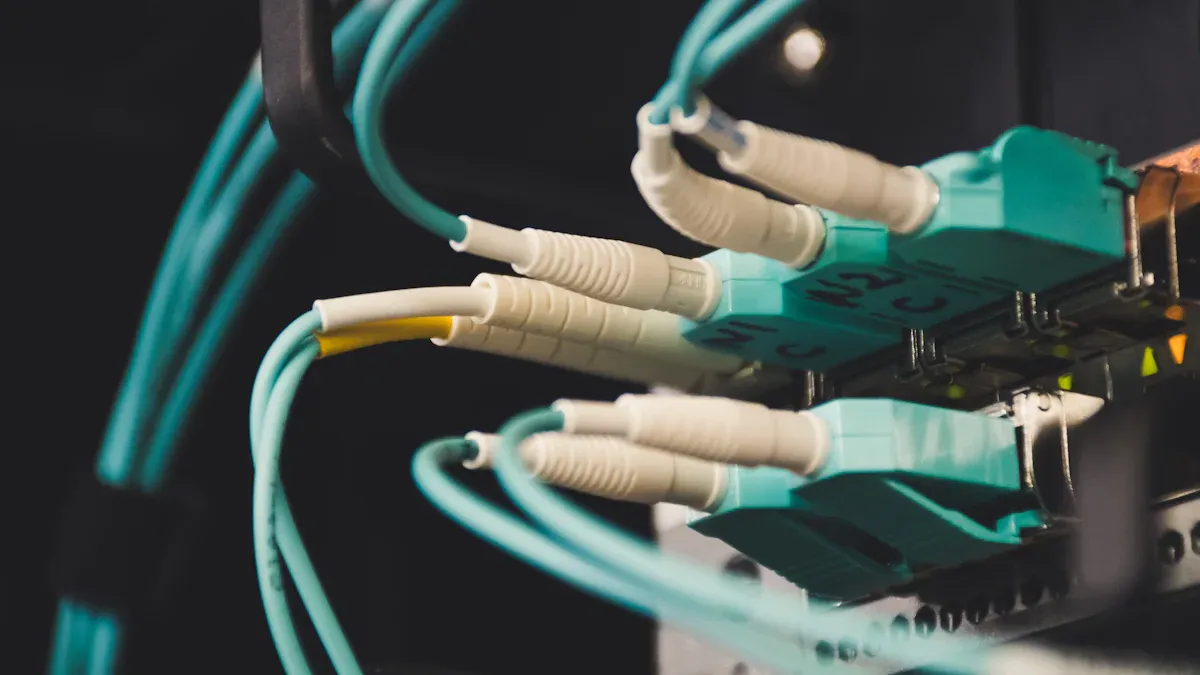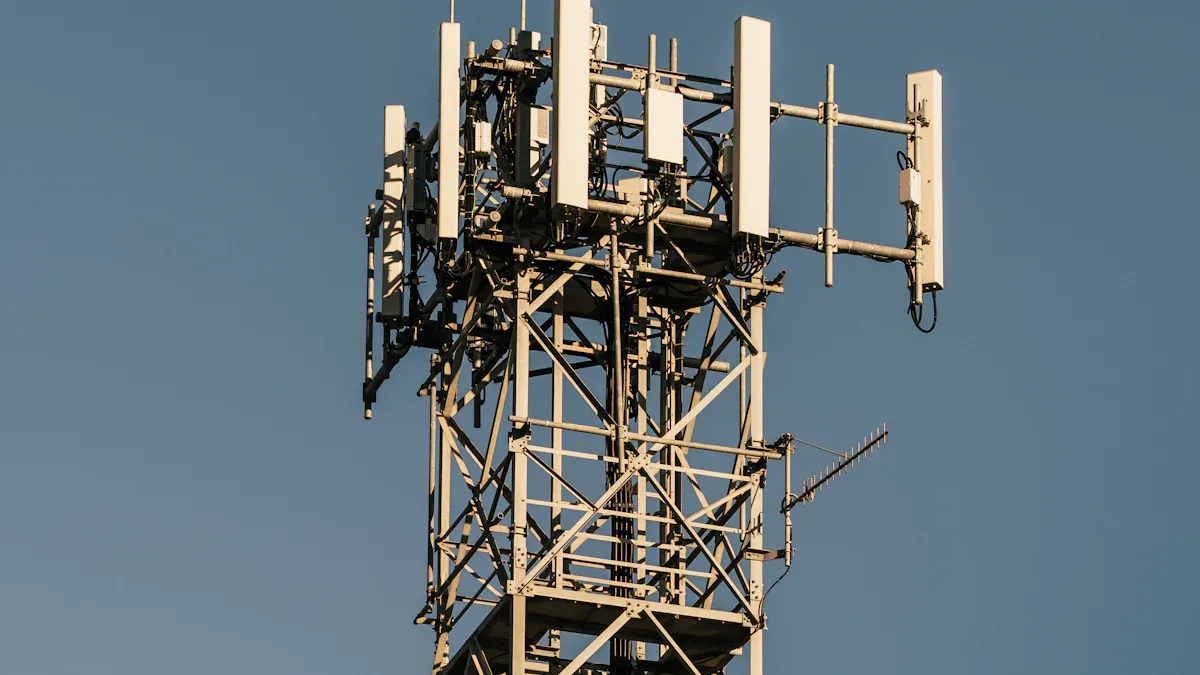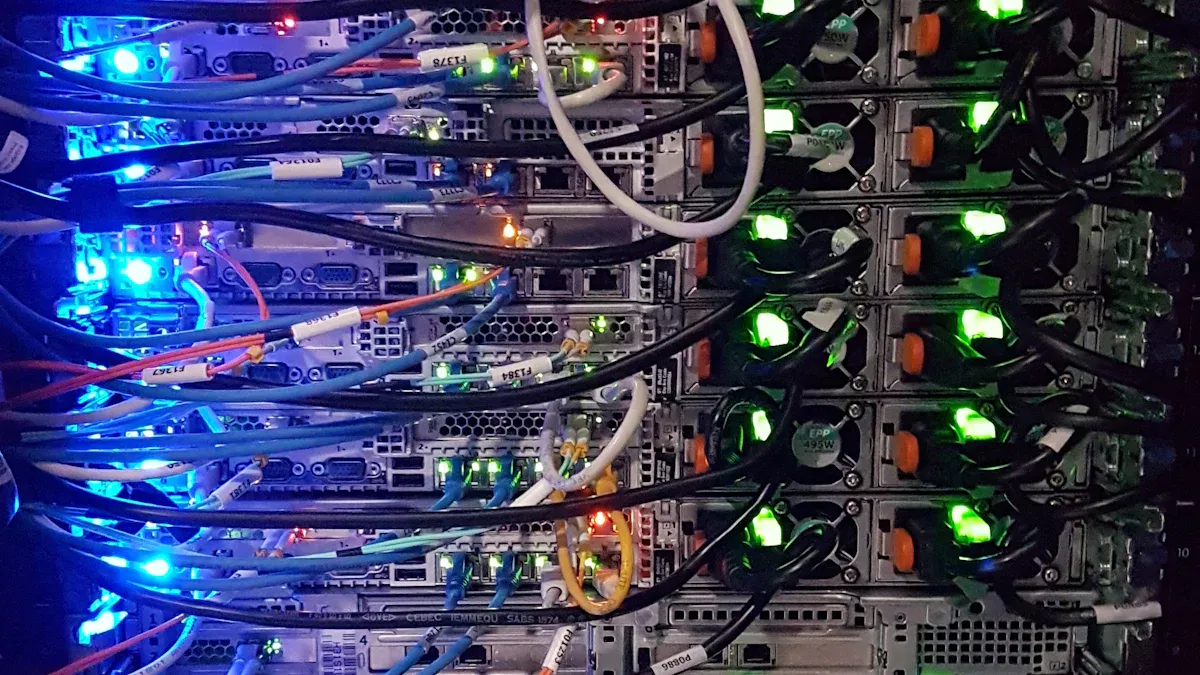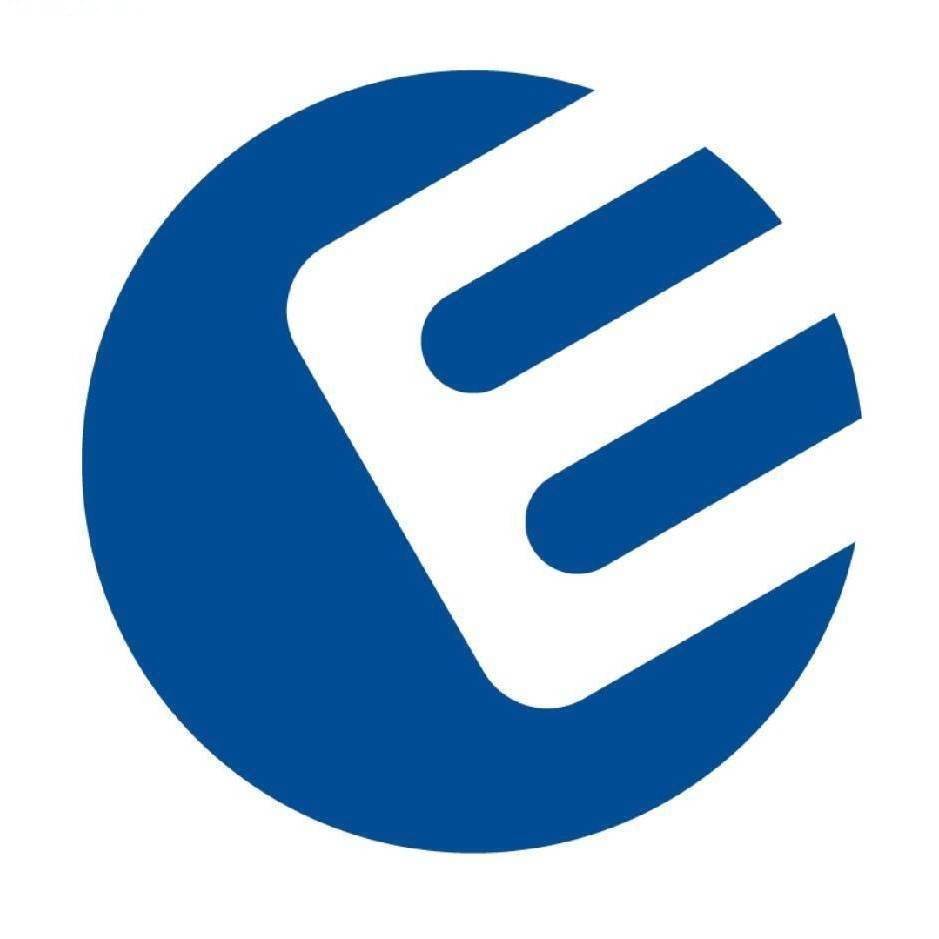What is a 48V Telecom Rectifier by ESTEL and How Does It Work

A telecom rectifier 48V serves as a critical component in modern telecommunications. It converts alternating current (AC) into direct current (DC) to provide stable power for telecom systems. This ensures that sensitive equipment operates reliably without interruptions.
You might wonder why 48V is the standard. It minimizes power loss while maintaining safety, making it ideal for telecom applications. The growing demand for efficient power systems, especially with 5G rollouts, has made these telecom rectifiers 48V essential.
ESTEL, a global leader in telecom power solutions, offers advanced telecom rectifiers 48V with up to 97% efficiency. Their innovative designs reduce energy waste and operational costs, ensuring long-term reliability for your telecom infrastructure.
Key Takeaways
A 48V telecom rectifier changes AC power into DC power. It gives steady power to telecom systems and stops interruptions.
Using 48V systems cuts power loss and improves safety. This makes them great for busy systems like 5G networks.
ESTEL's rectifiers work with over 95% efficiency. They save energy, lower costs, and help the environment.
These rectifiers guard delicate equipment from power spikes. This keeps systems running well even in tough conditions.
Adding 48V rectifiers to renewable energy lowers costs. It also helps create greener telecom solutions.
Understanding the Telecom Rectifier 48V
What is a 48V DC Rectifier?
A 48V DC rectifier is a device that converts alternating current (AC) into direct current (DC) at a voltage level of 48 volts. This conversion is essential for powering telecom systems, which rely on DC for stable and efficient operation. You’ll find these rectifiers in telecom towers, data centers, and other critical infrastructure where uninterrupted power is vital.
The design of a 48V DC rectifier prioritizes efficiency and reliability. For example, models like the GPE48200E are tailored for outdoor telecom cabinets. These systems reduce energy consumption, which lowers environmental impact and minimizes cooling requirements. By optimizing energy use, they ensure your telecom equipment operates smoothly even in demanding conditions.
Why is 48V the Standard in Telecom Systems?
The 48V standard in telecom systems has historical roots and technical advantages. It minimizes power loss during transmission while maintaining safety for operators and equipment. Compared to lower voltage options like 12V, 48V reduces current draw by a factor of four. This leads to a 16-fold reduction in conduction losses, enhancing thermal performance and overall efficiency.
Major tech companies like Microsoft, Google, and Amazon drive the demand for 48V systems. Their large-scale data centers benefit from the energy savings and reliability these systems offer. The adoption of 48V power shelves also supports the transition to more efficient telecom infrastructure, making it a preferred choice for modern networks.
Key Applications in Telecommunications
You’ll see 48V DC rectifiers in various telecom applications. They play a crucial role in powering telecom towers, ensuring stable connectivity for mobile networks. In data centers, these rectifiers provide reliable power to servers and storage systems, supporting high-speed data processing and storage.
Backup power systems also rely on 48V DC rectifiers. During outages, these systems maintain uninterrupted power supply to critical telecom equipment. Additionally, they integrate seamlessly with renewable energy sources like solar panels, enabling sustainable power solutions for telecom infrastructure.
Efficiency Range | Description |
|---|---|
90% to 92% | Standard efficiency for many telecom rectifiers, balancing cost and performance. |
92% to 94% | High-efficiency models designed for energy savings and operational efficiency. |
95% and Above | Ultra-high-efficiency models ideal for large-scale installations, maximizing energy efficiency. |
These efficiency levels highlight the performance of 48V DC rectifiers, making them indispensable for telecom systems.
How a 48V DC Rectifier Works

The AC to DC Conversion Process
The primary function of a 48V DC rectifier is to convert alternating current (AC) into direct current (DC). This process ensures a stable and reliable power supply for telecom systems. The conversion begins with an input transformer that adjusts the AC voltage to the required level. The rectifier then uses diodes to allow current to flow in only one direction, effectively converting AC into pulsating DC. Finally, a filter smooths the output to produce a steady DC voltage.
Efficiency plays a critical role in this process. High-efficiency rectifiers minimize energy losses while maintaining excellent performance. Advanced technologies, such as Schottky barrier diodes, reduce leakage currents to as low as 10µA. Wide bandgap semiconductors and low forward voltage drops further enhance thermal performance and durability. Studies also show that DC distribution systems, like those used in telecom rectifiers, outperform AC systems in reliability. This reliability is crucial for maintaining efficient telecom operations.
Metric | Description |
|---|---|
Peak Inverse Voltage (PIV) | Indicates the maximum voltage a rectifier can withstand in reverse bias. |
Ripple Factor | Measures the AC component in the output DC signal, affecting smoothness. |
Transformer Utilization Factor (TUF) | Reflects the efficiency of the transformer in converting AC to DC. |
These metrics highlight the importance of precision in the AC to DC conversion process, ensuring your telecom equipment operates without interruptions.
Key Components of a Telecom Rectifier
A 48V DC rectifier consists of several key components that work together to deliver reliable power. The input transformer adjusts the incoming AC voltage, while the rectifier circuit converts it to DC. Filters and regulators then smooth and stabilize the output voltage. Advanced models also include microcontrollers for monitoring and control.
Reliability is a top priority for these components. For instance, the required lifetime of a telecom rectifier exceeds 10 years, with a mean time between failures (MTBF) of over 1,000,000 hours. Protection features like over-voltage and short-circuit protection safeguard the system from potential damage. Effective thermal management ensures the rectifier operates efficiently even under high loads.
Metric | Value |
|---|---|
Required Lifetime | ≥ 10 years |
Mean Time Between Failures (MTBF) | > 1,000,000 hours |
These robust components and protection mechanisms make the 48V DC rectifier a reliable choice for telecom applications.
Features for Efficiency and Reliability
Modern 48V DC rectifiers incorporate features designed to maximize efficiency and reliability. High conversion efficiency reduces energy waste, lowering operational costs. For example, a 48V voltage regulator achieves a peak efficiency of 92.7% and a full-load efficiency of 90.0%. This outperforms traditional 12V solutions, which suffer from higher energy losses. Additionally, the 48V system offers a power density of 1.9 kW/in³, making it both compact and efficient.
Advanced rectifiers also include intelligent monitoring systems. These systems track performance metrics in real-time, allowing you to identify and address issues before they escalate. Integration with renewable energy sources, such as solar panels, further enhances sustainability. By combining efficiency, reliability, and adaptability, these rectifiers meet the demands of modern telecom infrastructure.
Importance of 48V Telecom Rectifiers in Telecom Systems
Ensuring Stable Power Supply
A stable power supply is essential for telecom systems to function without interruptions. The 48V DC rectifier plays a pivotal role in achieving this stability. By converting AC to DC, it ensures that your telecom equipment receives a consistent and reliable power source. This is especially important in high-density networks where power fluctuations can disrupt operations. The demand for mobile data continues to grow, requiring more cellular sites and efficient power solutions. The compact and reliable design of 48V rectifiers makes them ideal for meeting these demands while maintaining operational efficiency.
Supporting Critical Telecom Equipment
Telecom equipment, such as servers, routers, and base stations, relies on a dependable power source to operate effectively. The 48V DC rectifier provides the necessary voltage regulation to protect sensitive components from damage caused by power surges or fluctuations. Compared to other power solutions, 48V systems offer enhanced voltage regulation and reduced power losses. For instance, they lower I²R losses, which improves overall efficiency and reduces heat generation. This ensures that your critical telecom equipment remains operational even under heavy workloads, supporting seamless communication and data transfer.
Metric | 48V Systems | Other Power Solutions |
|---|---|---|
Efficiency | Reduced I²R losses | Higher I²R losses |
Power Density | Increased power density | Lower power density |
Voltage Regulation | Enhanced voltage regulation | Less stable voltage regulation |
Design Flexibility | More design choices | Limited design options |
Compatibility with Renewables | Matches solar panel output | May require additional conversion |
Enhancing Network Reliability
Network reliability depends on the consistent performance of your telecom infrastructure. The 48V DC rectifier enhances this reliability by minimizing power disruptions and ensuring efficient energy use. Unlike traditional 12V systems, 48V systems reduce cabling complexity and power losses by a factor of 16. They also decrease capacitor volume by a factor of 4, making them more compact and efficient. These features allow you to build a robust telecom network capable of handling increasing data demands. By integrating seamlessly with renewable energy sources, 48V rectifiers further improve sustainability and reduce operational costs.
Tip: Investing in a high-quality 48V telecom rectifier ensures long-term reliability and efficiency for your telecom systems.
Benefits of ESTEL's 48V Telecom Rectifiers
High Efficiency and Performance
You benefit from ESTEL's 48V DC rectifiers because they deliver exceptional efficiency and performance. These rectifiers achieve conversion efficiencies exceeding 98%, minimizing energy losses and lowering operational costs. Their advanced designs ensure consistent power delivery, even under demanding conditions. By reducing heat generation, they improve thermal management and extend the lifespan of your telecom equipment.
The high efficiency of ESTEL's rectifiers also supports sustainable energy use. You can integrate them with renewable energy sources like solar panels to create eco-friendly telecom systems. This combination reduces your carbon footprint while maintaining reliable power for critical infrastructure. Whether you're powering telecom towers or data centers, ESTEL's rectifiers optimize energy use and enhance system reliability.
Advanced Features and Customization
ESTEL's 48V DC rectifiers offer advanced features that adapt to your specific needs. Their ultra-modular designs allow you to scale systems easily, accommodating growth in your telecom network. These rectifiers incorporate AI integration, enabling intelligent monitoring and performance optimization. You gain real-time insights into system health, helping you address issues before they impact operations.
Customization is another key advantage. ESTEL's rectifiers are tailored for diverse applications, including battery charging, motor control, and powering electronic devices. They also play a vital role in industries like metal finishing and electric vehicle manufacturing. Technical datasheets provide detailed specifications, ensuring compatibility with your existing infrastructure. With ESTEL, you get rectifiers that meet your unique requirements while maintaining high efficiency and reliability.
Proven Expertise in Telecom Power Solutions
ESTEL's expertise in telecom power solutions sets them apart. Their innovative designs and commitment to quality have earned them a reputation as a trusted provider. Leading companies like Google, Facebook, and Microsoft have adopted similar energy-efficient strategies to enhance their operations. For example, Google improved cooling systems and reduced standby power, saving 40% on energy use. Microsoft leveraged renewable energy sources to lower emissions and energy consumption.
ESTEL applies these principles to their rectifiers, ensuring you benefit from cutting-edge technology. Their focus on efficiency, reliability, and sustainability aligns with the needs of modern telecom networks. By choosing ESTEL, you gain access to proven solutions that support your infrastructure and reduce operational costs.
Company | What They Did | Energy Benefits |
|---|---|---|
Used machine learning to improve cooling and cut standby power. | Saved 40% on energy use. | |
Added evaporative cooling and virtualized servers. | Achieved a low PUE score of 1.06. | |
Microsoft | Used free cooling and renewable energy sources. | Lowered energy use and reduced emissions. |
Apple | Built solar panels and used natural cooling methods. | Earned LEED Platinum certification. |
Applications of 48V DC Rectifiers

Use in Telecom Towers and Data Centers
You’ll find 48V DC rectifiers widely deployed in telecom towers and data centers. These rectifiers ensure a stable power supply, which is critical for maintaining uninterrupted communication and data processing. Telecom towers rely on them to power base stations, antennas, and other equipment, enabling seamless connectivity for mobile networks. In data centers, they support servers and storage systems, ensuring high-speed data handling and minimal downtime.
Modern rectifiers, such as the Flatpack2 SHE, achieve up to 98% efficiency, significantly reducing energy waste. This efficiency translates to lower operational costs and a smaller carbon footprint. For example, Bharti Airtel reported a 15% reduction in energy costs after upgrading to modular DC power systems. These advancements make 48V rectifiers an essential component in optimizing energy consumption for telecom infrastructure.
Metric | Value |
|---|---|
Energy consumption in telecom OPEX | Up to 40% |
Efficiency of modern rectifiers | 98% |
Efficiency of legacy systems | 85-90% |
Energy cost reduction reported by Bharti Airtel | 15% after upgrading to modular DC power systems |
Role in Backup Power Systems
Backup power systems depend on 48V DC rectifiers to maintain uninterrupted power during outages. These rectifiers charge batteries efficiently, ensuring they are ready to supply power when needed. By providing a consistent DC output, they protect sensitive telecom equipment from voltage fluctuations and power surges.
Newer rectifiers, like the Flatpack2 HE, support the demands of advanced networks such as 5G and 6G. They enable higher voltage outputs safely, improving overall system efficiency. With an efficiency rating of up to 96%, these rectifiers minimize power loss, ensuring reliable performance even in critical situations. This reliability makes them indispensable for backup power systems in telecom infrastructure.
The efficiency rating for telecom rectifiers can reach up to 96%, meaning only about 4% of power is lost during AC to DC conversion.
These rectifiers reduce waste by up to 50%, contributing to cost savings and environmental sustainability.
Integration with Renewable Energy Sources
You can integrate 48V DC rectifiers seamlessly with renewable energy sources like solar panels and wind turbines. This integration supports sustainable power solutions for telecom systems, reducing reliance on traditional energy sources. The 48-volt DC power output aligns well with the voltage levels of renewable energy systems, simplifying the setup and improving efficiency.
By combining rectifiers with renewable energy, you can lower operational costs and reduce carbon emissions. For instance, modern rectifiers like the Flatpack2 SHE help telecom operators achieve significant CO2 reductions. These systems also enhance energy storage capabilities, ensuring a steady power supply even when renewable sources fluctuate. This adaptability makes 48V rectifiers a key player in building greener telecom networks.
Rectifier Model | Efficiency (%) | Waste Reduced (%) | Cost Savings (USD) | CO2 Reduction (tons) |
|---|---|---|---|---|
Flatpack2 SHE | 98 | 50 | N/A | N/A |
Flatpack2 HE (2008) | 96.5 | N/A | 835 million | 5 million |
Previous Models | 92 | N/A | N/A | N/A |
Note: Integrating renewable energy with 48V DC rectifiers not only enhances efficiency but also supports global sustainability goals.
A 48V telecom rectifier converts AC power to DC, ensuring a stable and efficient energy supply for telecom systems. Its ability to regulate voltage protects sensitive equipment and supports uninterrupted operations. You rely on these rectifiers to maintain network reliability, especially in high-demand environments like data centers and telecom towers.
ESTEL stands out as a trusted provider of 48V telecom rectifiers. Their designs achieve efficiency ratings above 95%, reducing energy losses and operational costs. These rectifiers endure extreme conditions, offering reliable performance in high temperatures and humidity. Features like tool-less access and self-diagnostic systems simplify maintenance and enhance usability.
Feature | Description |
|---|---|
Efficiency Ratings | ESTEL's rectifiers achieve efficiency ratings above 95%, minimizing energy losses. |
Durability | Designed to endure extreme conditions, ensuring reliable operation in high temperatures and humidity. |
Maintenance Features | Tool-less access for inspections and self-diagnostic systems for real-time alerts enhance usability. |
Choosing ESTEL ensures you benefit from cutting-edge technology and proven reliability, making them an ideal partner for your telecom power needs.
FAQ
What makes a 48V telecom rectifier better than other voltage options?
A 48V telecom rectifier minimizes power loss and improves efficiency. It reduces current draw, which lowers heat generation and enhances safety. This voltage standard also supports modern telecom systems, ensuring reliable performance for high-demand applications like 5G networks and data centers.
Can you use a 48V rectifier with renewable energy sources?
Yes, you can integrate 48V rectifiers with renewable energy sources like solar panels. Their compatibility simplifies the setup and improves efficiency. This integration reduces operational costs and supports sustainable energy solutions for telecom systems, making them eco-friendly and cost-effective.
How does a 48V rectifier ensure equipment safety?
A 48V rectifier regulates voltage and protects sensitive telecom equipment from power surges and fluctuations. Features like over-voltage protection and short-circuit safeguards prevent damage. These mechanisms ensure your equipment operates reliably, even under challenging conditions.
Why is ESTEL a trusted provider of 48V telecom rectifiers?
ESTEL offers high-efficiency rectifiers with advanced features like intelligent monitoring and modular designs. Their products achieve efficiency ratings above 95%, reducing energy losses. With proven expertise and durable designs, ESTEL ensures reliable performance for your telecom infrastructure.
Are 48V rectifiers suitable for backup power systems?
Yes, 48V rectifiers are ideal for backup power systems. They efficiently charge batteries and provide consistent DC output during outages. This ensures uninterrupted power for critical telecom equipment, maintaining network reliability even in emergencies.
Tip: Choose a high-quality 48V rectifier to enhance your telecom system's efficiency and reliability.
See Also
Understanding the ESTEL Power System for Telecom Cabinets
Ensuring Optimal Voltage Levels in ESTEL Communication Cabinets
Telecom Cabinets by ESTEL: The Role of Energy Storage
Integrating Smart Microgrids with ESTEL Telecom Energy Storage
Calculating Power Systems and Batteries for Telecom Cabinets
CALL US DIRECTLY
86-13752765943
3A-8, SHUIWAN 1979 SQUARE (PHASE II), NO.111, TAIZI ROAD,SHUIWAN COMMUNITY, ZHAOSHANG STREET, NANSHAN DISTRICT, SHENZHEN, GUANGDONG, CHINA

